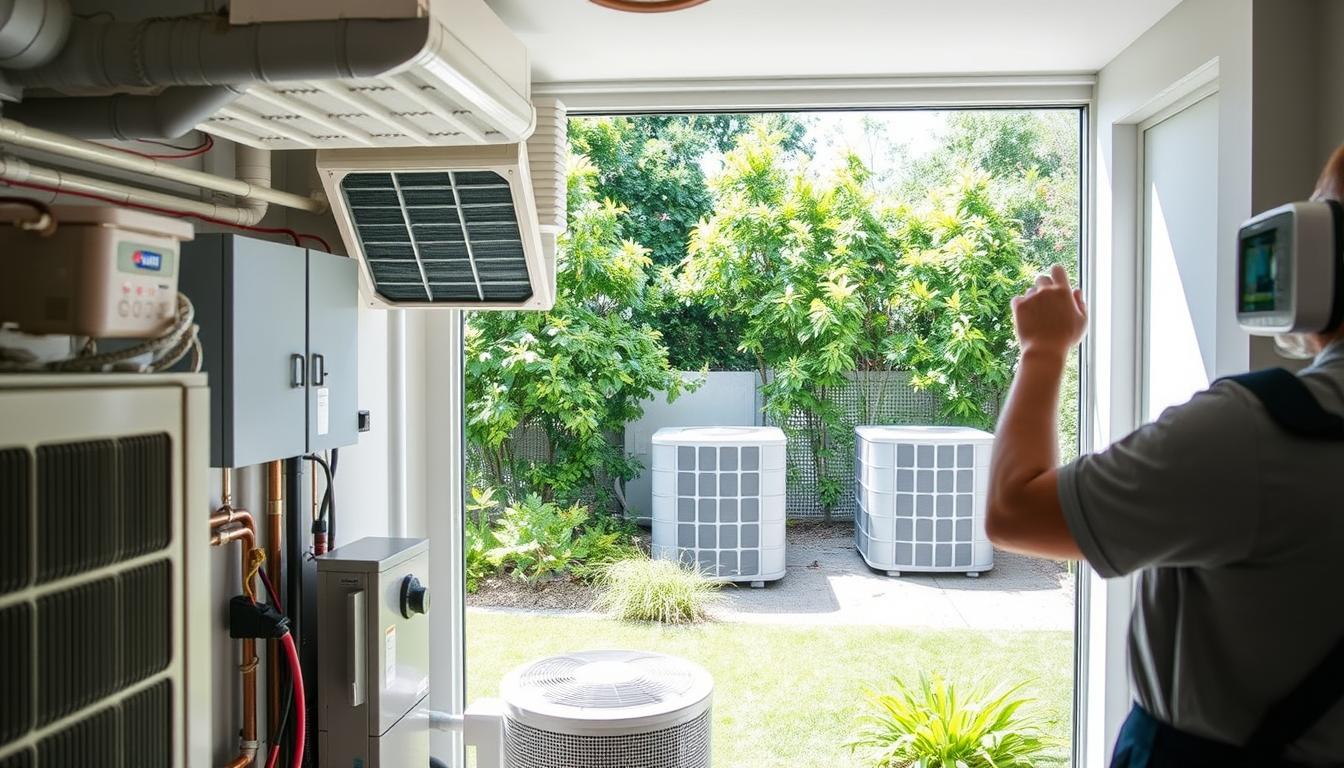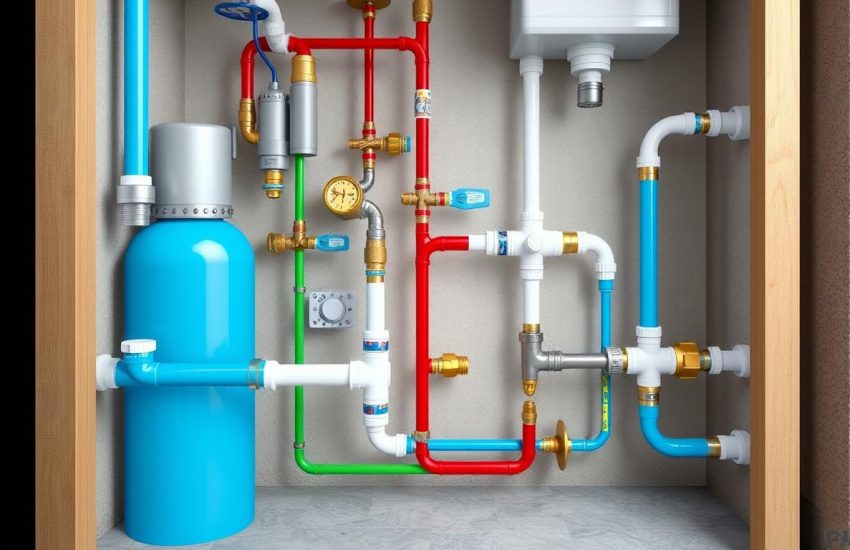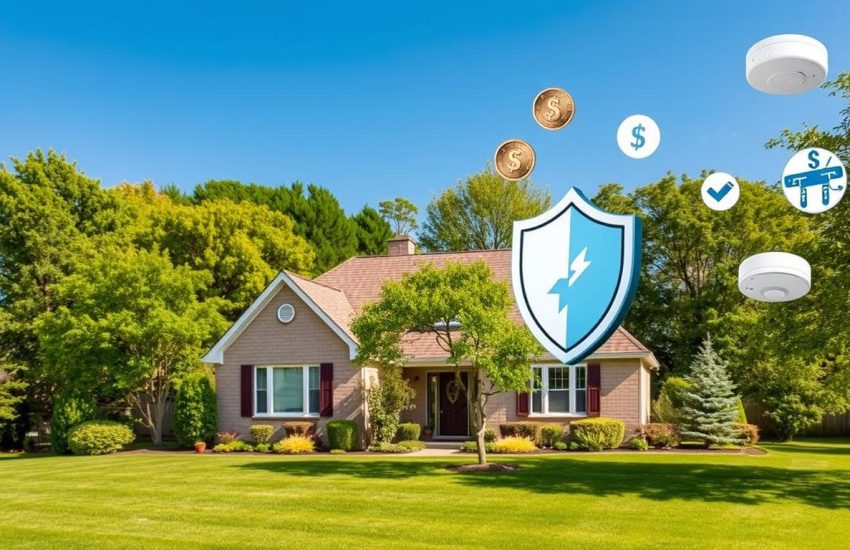Hvac System Savings: A Complete Guide for Homeowners
Have you ever thought about how your HVAC keeps your home comfy and saves you money? It keeps you warm in winter and cool in summer. But, have you thought about the cost and how it affects the environment? This guide talks about how to save money with your HVAC. It also covers how to make your home more energy-efficient.
Doing regular checks can prevent expensive repairs. It makes sure your HVAC runs well. Notice any high bills or strange sounds? This might mean something’s wrong. Getting it checked early can save you money. It can lead to quick fixes and long-term savings.
Key Takeaways
- Understanding your HVAC system’s role in energy consumption and comfort.
- Recognizing signs that indicate the need for system maintenance or upgrades.
- Learning the balance between DIY maintenance and when to seek professional help.
- Exploring potential savings and efficiencies through repairs, upgrades, and routine inspections.
- Considering seasonal timing for maintenance to avoid peak service demand periods.
- Utilizing incentives and financing options for investing in energy-efficient systems.
Why Focus on HVAC System Savings?
Focusing on efficient heating and cooling is key as energy use and costs rise. Specifically, HVAC systems use almost half of a building’s energy. This means big chances to save money on HVAC system operation and upkeep.
An efficient HVAC system cuts down on energy bills. It makes inside spaces more comfortable. It also gives us cleaner air and lessens our environmental footprint. With newer tech, the trend toward efficiency is getting stronger. This includes higher SEER (Seasonal Energy Efficiency Ratio) and EER (Energy Efficiency Ratio) standards.
By 2023, HVAC tech has improved. The government now requires small commercial systems to be at least 15 SEER and 12.5 EER. For bigger buildings, SEER ratings might need to be in the mid-20s. This depends on their size and how they’re used.
| System Size | Minimum SEER Rating | Minimum EER Rating | Annual Savings Potential |
|---|---|---|---|
| Small Commercial ( | 15 SEER | 12.5 EER | Up to 40% |
| Large Commercial | 18-25 SEER | Varies | Significant |
| Residential | Increased by 1.0 SEER in 2023 | – | Up to 30% |
Also, getting energy-efficient HVAC systems cuts costs and repair worries. These systems are made to last longer and handle the use in homes and businesses.
The U.S. Department of Energy says making HVAC systems more efficient reduces power bills. For instance, a mid-sized store can save between $32,000 and $48,000 a year. Rebates and tax breaks make these updates easier to afford. This means investment costs get balanced out by the long-term money and environmental benefits.
To wrap it up, going for more efficient heating and cooling lowers energy bills. It also supports our goal of taking care of the planet. So, using better HVAC tech is a smart choice. It helps us save money now and prepares us for future energy challenges and rules.
DIY vs Professional Help
Thinking about DIY HVAC system savings, homeowners see the upfront cost savings first. Changing air filters or cleaning the system by yourself can save money. But, when it comes to installations or big repairs, things get tricky. Without the right skills, mistakes can happen. These mistakes can be expensive.
Seeking professional HVAC analysis costs more at first. But, it ensures your unit is the right size, wired correctly, and meets local codes. These points make your system work better and safer over time. They help save money in the long run.
| Aspect | DIY Installation | Professional Installation |
|---|---|---|
| Initial Cost | Lower | Higher (includes equipment, labor, permits) |
| Risks | Possible incorrect sizing, wiring errors | Reduced risk due to professional handling |
| Long-term Savings | Potentially lower due to inefficiencies | Higher due to efficient setup and fewer repairs |
| Warranties | May void manufacturer’s warranty | Often includes extended warranties |
| Safety | Potential risks with electrical and refrigerant handling | Adheres to safety standards with professional equipment and knowledge |
| Lifespan of System | May decrease due to poor installation | Typically 15-20 years for air conditioners, up to 30 years for furnaces |
| Maintenance Needs | High, with a greater likelihood of early replacements | Regular professional maintenance ensures longevity |
Looking at the table, it’s clear. DIY can save money now, but experts save you from future troubles. They make sure everything is done right. Balancing DIY for easy tasks and using experts for the big stuff is smart. It saves the most money over time.
- Security: Handling HVAC parts, especially electrical and refrigerant parts, is risky without training.
- Compliance: Professionals make sure everything is up to local rules and codes.
- Quality: Experts have the training and certification to do the job well.
The choice between DIY and professional help depends on the project size, your skills, and cost over time. Make your decision wisely.
How to Save Money
To cut energy bills and save on HVAC systems, you need to take several steps. Keeping up with maintenance, like changing filters and yearly check-ups, is key. It makes your system work better and saves you a lot of money.
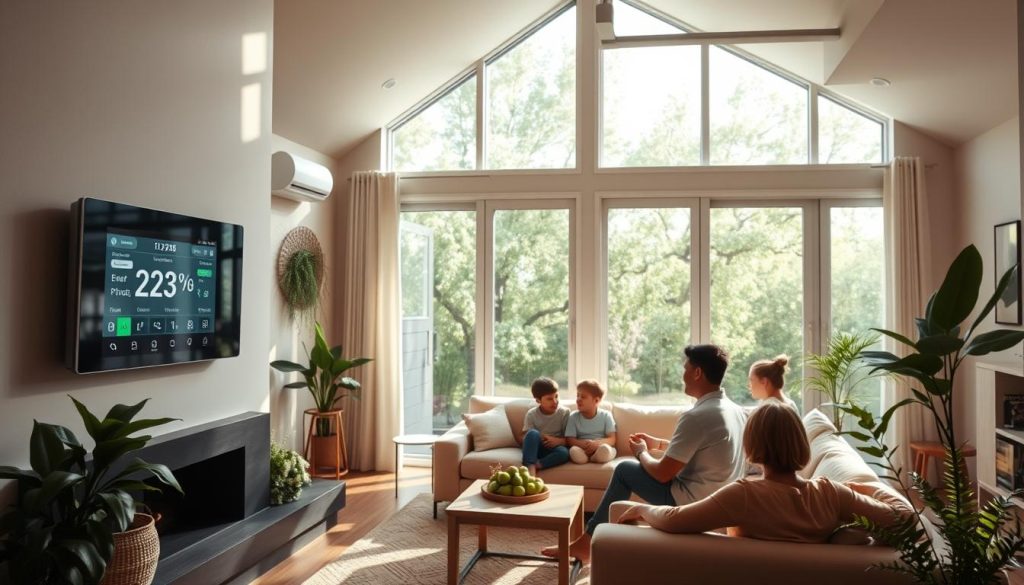
Sealing and insulating your ducts right can make your system up to 20% more efficient. Also, picking ENERGY STAR certified units when it’s time to replace equipment can really help lower your bills over time.
Smart money management is also important. Looking for rebates and incentives can help cut down costs a lot. Learning the best times to buy new systems and the value of professional installation can stop expensive mistakes. It ensures your system runs well too.
| Consideration | Cost Saving Tip | Expected Benefit |
|---|---|---|
| Equipment Replacement | Opt for ENERGY STAR units | Reduce utility bills, qualify for rebates |
| Installation | Professional installation during low demand seasons | Avoid premium charges, ensure quality setup |
| Maintenance | Regular tune-ups and filter changes | Extend unit life, maintain efficiency |
| Financial Planning | Explore rebate programs and seasonal discounts | Lower initial investment, leverage savings |
Smartly using your thermostat or a smart thermostat can save about $100 each year. By doing these things, you don’t just spend less but also support a greener planet. In the end, spending a bit of time learning and looking for HVAC savings can greatly lower your energy bills. This improves your financial health and makes your home more comfortable.
Step-by-Step Upgrades
Improving your home’s HVAC system boosts energy efficiency and lowers your bills. It starts with checking your current system’s age and performance. Systems over 10 years old can see big improvements with a clear upgrade plan.
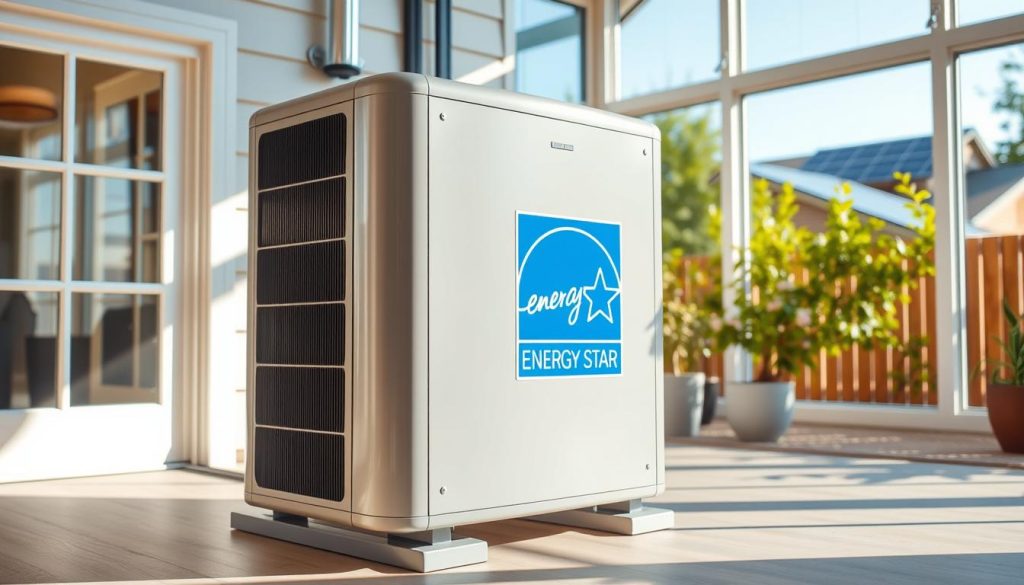
First, work on insulating ducts and fixing leaks. This stops heat or cool air from slipping out. It makes your system work better. This is really helpful for homes with old ducts, stopping energy loss in places like attics.
Next, think about getting new ENERGY STAR certified equipment. These units are more dependable and cut down on heating and cooling costs by up to 20%. They come with great features like smart technology and can help save even more money.
Then, putting in a smart thermostat is a smart move. It learns your routine and adjusts the temperature for you. This makes your home feel just right and saves on energy. Smart thermostats are key for an energy-saving house.
- Insulation of ducts: Improves air delivery and energy use.
- Installation of ENERGY STAR equipment: Increases system reliability and reduces energy bills.
- Smart thermostat integration: Optimizes heating and cooling schedules, slashes unnecessary energy consumption.
Finally, make sure experts do any new installs or upgrades. The right install boosts equipment efficiency and its life. Every step adds comfort to your home and helps the planet too.
Final Tips for Success
To enhance home comfort and save money, prioritize HVAC system maintenance. Regular upkeep ensures your system works well and avoids high costs from neglect. Without good airflow, your HVAC’s effectiveness can drop by up to 15 percent. Keep it running well by doing regular checks and using advanced high-efficiency HVAC equipment and thermostats.
The size and efficiency of HVAC systems are very important. They come measured in tons and have SEER ratings for efficiency. Efficient systems save money over time because they cost less to run. But, remember, how well a system works also depends on it being installed correctly. This is why certified professionals are key.
Before you upgrade or install new, look at online reviews. They help you know how well different models perform. Plan your budget for repairs or new systems wisely. This way, you’ll be ready and not worried when it’s time for a fix or replacement. Good planning and taking care of your HVAC helps keep your home pleasant. It saves money and is good for our planet too.

